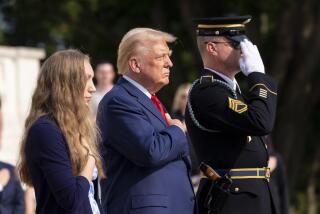Democrats Decry Silence on GOP Burial Waiver
- Share via
WASHINGTON — Republican lawmakers who questioned whether the Clinton administration gave friends special breaks for burial plots at Arlington National Cemetery failed to note that in one case under review, a House GOP staff member pulled strings to win a space for his father.
Robert B. Charles, staff chief for a House subcommittee with defense oversight responsibilities, sought to use his acquaintance with Defense Secretary William S. Cohen and a senior White House aide to win a waiver after cemetery officials rejected his initial request on July 21, documents show.
On July 24, Charles got a rare special meeting with Cohen and, on the same day, won a reversal--permission to bury his father at Arlington--from Army Secretary Togo D. West Jr., who oversees operations of the military’s most revered burial ground.
The Republicans’ silence to date on Charles’ case brought an angry response from some Democratic congressional aides, who asserted that GOP lawmakers conveniently overlooked Republican requests for waivers when they pointed fingers at the Clinton administration last week.
“This shows the hypocrisy of their whole campaign,” said one senior aide to a Democratic senator, who asked to remain unidentified.
Access to the crowded cemetery exploded into a national issue last week after a conservative magazine asserted, without citing specific cases, that the administration had been “selling” plots to large campaign contributors. GOP lawmakers, including those on the House Veterans’ Affairs Committee, have focused on nine cases--including Charles’--where waivers were granted over the recommendations of cemetery Supt. Jack Metzler.
Charles’ father, Roland Wilbur Charles, had expected to be given a final resting place at Arlington in the same grave as his parents. Although his Navy service didn’t entitle him to a new plot at the cemetery, the rules ordinarily would have allowed him to be buried in the same grave site occupied by his father and mother.
After his death on July 18, however, cemetery officials discovered that in the decades since Roland Charles’ father died, a root from the 100-year-old oak tree next to his grave had grown, completely filling the burial space. Charles could be buried in the cemetery only by displacing an eligible veteran.
Metzler opposed this, as did other Army officials going up the hierarchy, including West. But Robert Charles said he was determined to fight a decision he considered “innately, unconscionably unfair,” he said in a tearful interview.
He first appealed to Metzler by faxing a note to the superintendent on his subcommittee’s letterhead stationery. In it, he identified himself as chief of staff and general counsel of the House Government Reform and Oversight Committee’s subcommittee on national security, international affairs and criminal justice.
The subcommittee is mostly concerned with fighting drug trafficking, but it has some authority over the Pentagon.
Charles said he “regrets” using the stationery, a move that could be seen as an effort to influence military officials to grant a personal favor. But he insisted he would have fought for a waiver in the same way “if I’d been a taxi driver or a schoolteacher” or from any other walk of life.
He next appealed to Cohen, whom he had met several times, and to Bruce Reed, a White House domestic policy aide he had known during a stint at Oxford University in England. Charles said he called the two after Metzler told him his only avenues of appeal were through the president and the Defense secretary.
Reed didn’t talk to Charles directly, telling him through an assistant it would be “difficult” to secure a waiver, according to a White House spokesman. But Cohen allowed him to come to a meeting with Metzler and one of the Defense secretary’s senior aides, Robert Tyrer.
A Pentagon spokesman said that in seeing Charles, Cohen--a former Republican senator from Maine--was simply responding as he had for years when constituents called with personal problems.
Cohen also called West about the matter. The Army secretary said in an interview that he interpreted the call as meaning “Will you take another look at it?”
West said he didn’t consider the secretary’s call to be “all that important,” but that in his second look at the issue, he realized the family had by then suffered the anxiety of waiting six days for a decision. That fact drove him to conclude that “this has got to come to an end” and he reversed his earlier decision.
Spokesmen for several veterans’ groups said the case underscores the need for further investigation of the waivers, and for clarification of the rules.
“This clearly is a good time to review the rules,” said Phil Budahn, a spokesman for the American Legion. But he added that he saw merit in Charles’ appeal.
Mike Lewis, a spokesman for Rep. Terry Everett (R-Ala.), chairman of a House Veterans’ Affairs subcommittee, said that in calling for a probe, Everett had not focused solely on the Clinton administration’s alleged infractions.
“We’re going to look at waivers from Democrats and Republicans,” he said.
More to Read
Get the L.A. Times Politics newsletter
Deeply reported insights into legislation, politics and policy from Sacramento, Washington and beyond. In your inbox twice per week.
You may occasionally receive promotional content from the Los Angeles Times.











